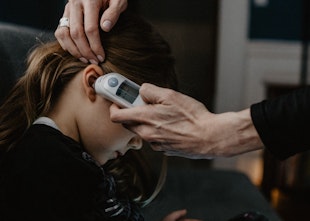It can be difficult to know if you should keep your child at home or not when they are not feeling well.
If you are a parent of a little one you will know how common it is for them to have a sniffle or a little cough and a runny nose. Little ones pick up a lot of illnesses both big and small; some are not contagious, and some are more serious and can easily be passed on.
It can be difficult to know if you should keep your child at home or not when they are not feeling well.
If you do keep your child at home and they have a contagious sickness that may have been passed on it's important to give the school or Montessori a ring. Let them know that they won't be in and give them the reason. This way they can let the other children’s parents know or if needs be any pregnant staff that may be affected.
If your child is well enough to go to school but has an infection that could be passed on, such as a cold sore or head lice or worms, let their teacher know.

How do you know when to keep your child home from school?
A quick rule of them is to ask yourself these three questions they will help you to get an idea on what you should do.
- Does your child have a temperature? Fevers of 38C or more are generally a sign of illness, so children should stay home from school.
- Does your child have an illness like the flu or chickenpox? If you think they might, don’t send your child back to school until you know they’re not contagious anymore.
- Is your child well enough to participate in class? If they seem too lethargic to participate in their day or you feel they wouldn’t be to play in the yard you should probably keep them at home to rest.
Most schools, Montessori’s, creche and playschools have their own policies in place when it comes to sickness. Always be sure to give your child’s a ring and see which policies are in place.
Here is some general rule of thumb practices for common sickness.
Chickenpox
If your child has chickenpox keep them off school until all the spots have crusted over. This is usually about 5-7 days after the spots first appeared. Remember to let their school know straight away as chickenpox is highly contagious.
Cold sores
There's no need to keep your child off school if they have a cold sore. Always encourage them not to touch the blister or kiss anyone while they have the cold sore, or to share things like cups and towels.

Conjunctivitis
You don't need to keep your child away from school if they have conjunctivitis. Do get advice from your pharmacist or your GP. Encourage your child not to rub their eyes and to wash their hands regularly.
Coughs and common colds
It's fine to send your child to school with a minor cough or cold. But if they have a temperature, remember, keep them off school until the temperature goes. Always encourage your child to throw away any used tissues and to wash their hands regularly.
Ear infection
If your child has an ear infection and a temperature or severe earache, keep them off school until they're feeling better or their fever goes away. Consult your pharmacist or your GP on what medication your child may need.
Hand, foot and mouth disease
If your child has hand foot and mouth disease but seems well enough to go to school, there's no need to keep them off. Encourage your child to throw away any used tissues straight away and to wash their hands regularly.
Head lice
There's no need to keep your child off school if they have head lice. Once you have treated them immediately since spotting them. Always remember to let your child’s teacher or care provider know your child has had headlice so they can let the other parents know. Ask your pharmacist the best options available to treat the headlice.
Impetigo
If your child has impetigo, they'll need antibiotic treatment from your GP. Keep them off school until all the sores have crusted over and healed, or for 48 hours after they start antibiotic treatment. Encourage your child to wash their hands regularly and not to share cups, towels etc with other children at school.

Scarlet fever
If your child has scarlet fever, they will need treatment with antibiotics from your GP. Otherwise they'll be infectious for 2 to 3 weeks. Your child can go back to school 24 hours after starting antibiotics.
Slapped cheek syndrome
You don't need to keep your child off school if they have slapped cheek because once the rash appears, they're no longer infectious. If you suspect your child has slapped cheek syndrome, take them to the GP and let their school know if they're diagnosed with it.
Sore throat
You can still send your child to school if they have a sore throat. But if it is accompanied with a temperature, they should stay at home until it goes away.
Threadworms
You don't need to keep your child off school if they have worms. It is important to let their teacher know though. Speak to your pharmacist, who can recommend a treatment.
Vomiting and diarrhoea
Children with diarrhoea or vomiting should stay away from school until 48 hours after their symptoms have gone.
Laura Doyle, Mum of 4. Kyle 9, Noa Belle 4, Briar 2 and Milla 12 months. Breastfeeder, co-sleeper, coffee drinker. Staying positive and inspired by the chaos of it all. Follow her on Instagram.






